What writer-director-sculptor AR Kara has to say about ‘Naked Problems’
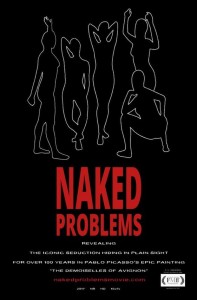 One of the films that will be screened during the 7th Annual Fort Myers Film Festival is Naked Problems. The 15-minute short delves into the heretofore unsolved mysteries implicit in Pablo Picasso’s 1907 masterwork, Les Demoiselles d’Avignon which today hangs in New York City’s famous Museum of Modern Art.
One of the films that will be screened during the 7th Annual Fort Myers Film Festival is Naked Problems. The 15-minute short delves into the heretofore unsolved mysteries implicit in Pablo Picasso’s 1907 masterwork, Les Demoiselles d’Avignon which today hangs in New York City’s famous Museum of Modern Art.
The film’s director is A.R. Kara, and here’s what he has to say about Naked Problems and Les Demoiselles d’Avignon.
“When young Pablo Picasso first showed his brazen 1907 masterwork to friends, it scandalized all but the poets. Three — Guillaume Apollinaire, Max Jacob and André Salmon — jokingly christened it The Philosophical Brothel.
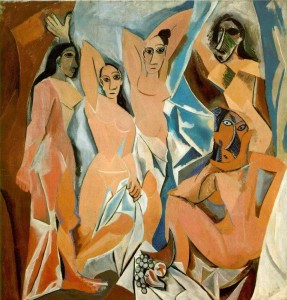 “Salmon later organized the colossal painting’s 1916 début, chastely rechristened [the painting as] The Demoiselles of Avignon, [but] still, its uncanny nudes scandalized Paris. Eight years later another poet, André Breton, finally coaxed Picasso into selling his misunderstood masterwork. Today, the Demoiselles draws crowds at New York’s Museum of Modern Art (MoMA), much as Leonardo da Vinci’s Mona Lisa does at The Louvre.
“Salmon later organized the colossal painting’s 1916 début, chastely rechristened [the painting as] The Demoiselles of Avignon, [but] still, its uncanny nudes scandalized Paris. Eight years later another poet, André Breton, finally coaxed Picasso into selling his misunderstood masterwork. Today, the Demoiselles draws crowds at New York’s Museum of Modern Art (MoMA), much as Leonardo da Vinci’s Mona Lisa does at The Louvre.
“My first encounter with The Demoiselles of Avignon drew a complete blank. Its larger-than-life nudes stared me down. 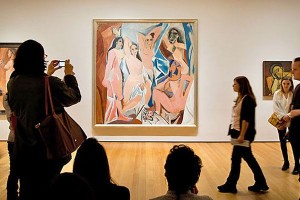 Time and again, I stood before the spellbinding Demoiselles at MoMA, silently demanding right understanding. Years passed, then one cold and rainy New York weeknight I was its only caller, when suddenly one demoiselle flashed to life. Her charged visage mirrored my then lover’s at the dawning of our hookup.
Time and again, I stood before the spellbinding Demoiselles at MoMA, silently demanding right understanding. Years passed, then one cold and rainy New York weeknight I was its only caller, when suddenly one demoiselle flashed to life. Her charged visage mirrored my then lover’s at the dawning of our hookup.
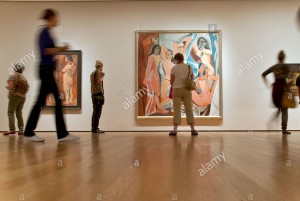 “Researching that seductive painting, it stood out that its defining titles are not by Picasso, who purposely avoided titling his artworks. It also stood out that Picasso would only jokingly explain this masterwork and wrote just one cryptic mention of it, in his wry 1941 play, Desire Caught By The Tail.
“Researching that seductive painting, it stood out that its defining titles are not by Picasso, who purposely avoided titling his artworks. It also stood out that Picasso would only jokingly explain this masterwork and wrote just one cryptic mention of it, in his wry 1941 play, Desire Caught By The Tail.
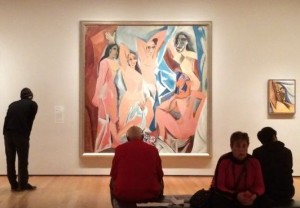 “Art history interprets this ‘brothel’ painting based on storied titles by Picasso’s poet posse, his summarily abandoned preliminary sketches and a few secondhand accounts. Critics have from the beginning defined Cubism, which came next, in purely descriptive terms, lacking the hiding-in-plain-sight narrative of the Demoiselles.
“Art history interprets this ‘brothel’ painting based on storied titles by Picasso’s poet posse, his summarily abandoned preliminary sketches and a few secondhand accounts. Critics have from the beginning defined Cubism, which came next, in purely descriptive terms, lacking the hiding-in-plain-sight narrative of the Demoiselles.
“Poetry and sculpture booted my life in the arts. Sculpting 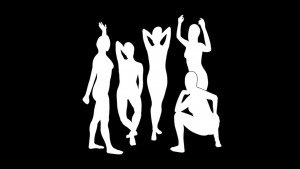 a human figure, I often strike a pose to know it inside out. When seized to strike the Demoiselles‘ five iconic poses, an understanding sprang to mind.
a human figure, I often strike a pose to know it inside out. When seized to strike the Demoiselles‘ five iconic poses, an understanding sprang to mind.
“Picasso revered poets. Early on in Paris, he had scrawled ‘the rendezvous of poets’ on his studio door.  Decades later, he abandoned the visual arts and dedicated himself to writing poetry, continuing even after he resumed painting.
Decades later, he abandoned the visual arts and dedicated himself to writing poetry, continuing even after he resumed painting.
“Sharing my Demoiselles revelation in verse came naturally. Eyes can glaze when I recite my discovery, yet when I also strike the five poses all instantly grasp their logic in action. So, over four decades, the need possessed me to make this movie, Naked Problems.”
RELATED POSTS.
- Overview of the 7th Annual Fort Myers Film Festival
- Why you should see ‘Naked Problems’
- Why you should see ‘Paradise Reef’
- Meet ‘Paradise Reef’ writer and director John Scoular
- A word or two about Everglades fine art photographer Clyde Butcher
- Meet ‘Paradise Reef’ cinematographer and commentator Andy Brandy Casagrande IV
- A look back at John Scoular documentary ‘Marcus Jansen: Examine & Report’
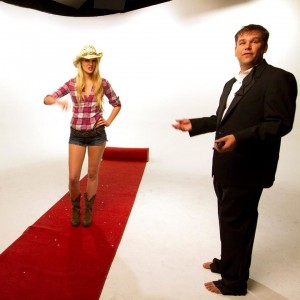 Lake O discharge documentary, ‘Black Tide,’ to open Fort Myers Film Festival
Lake O discharge documentary, ‘Black Tide,’ to open Fort Myers Film Festival- Meet ‘Black Tide’ writer, director and producer Steven Johnson
- Read what ‘Black Tide’ filmmaker Steven Johnson has to say about his documentary
- How the Everglades, Caloosahatchee and St. Lucie got so bad
- Why you should see ‘Bubbles’
- How ‘Bubbles’ got made
- Meet ‘Bubbles’ screenwriter and maniacal clown
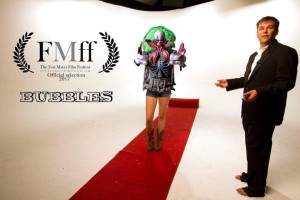 Cesar Aguilera
Cesar Aguilera - Why you should see ‘The Radical Jew’
- ‘Radical Jew’ awards and accolades
- Why you should see ‘The Stairs’
- Why the filmmakers made ‘The Stairs’
- Why you should see ‘Three Wishes’ at this year’s Fort Myers Film Festival
- Meet ‘Three Wishes’ writer, director and producer Curtis Collins













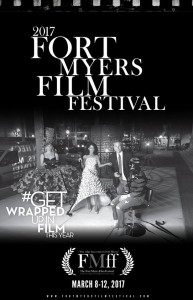

 Tom Hall is both an amateur artist and aspiring novelist who writes art quest thrillers. He is in the final stages of completing his debut novel titled "Art Detective," a story that fictionalizes the discovery of the fabled billion-dollar Impressionist collection of Parisian art dealer Josse Bernheim-Jeune, thought by many to have perished during World War II when the collection's hiding place, Castle de Rastignac in southern France, was destroyed by the Wehrmacht in reprisal for attacks made by members of the Resistance operating in the area. A former tax attorney, Tom holds a bachelor's degree as well as both a juris doctorate and masters of laws in taxation from the University of Florida. Tom lives in Estero, Florida with his fiancee, Connie, and their four cats.
Tom Hall is both an amateur artist and aspiring novelist who writes art quest thrillers. He is in the final stages of completing his debut novel titled "Art Detective," a story that fictionalizes the discovery of the fabled billion-dollar Impressionist collection of Parisian art dealer Josse Bernheim-Jeune, thought by many to have perished during World War II when the collection's hiding place, Castle de Rastignac in southern France, was destroyed by the Wehrmacht in reprisal for attacks made by members of the Resistance operating in the area. A former tax attorney, Tom holds a bachelor's degree as well as both a juris doctorate and masters of laws in taxation from the University of Florida. Tom lives in Estero, Florida with his fiancee, Connie, and their four cats.